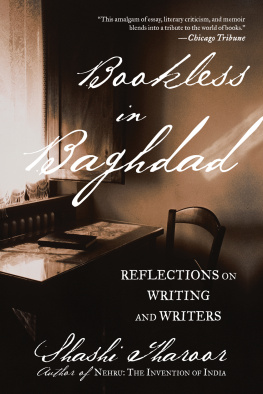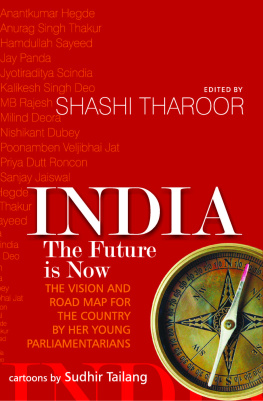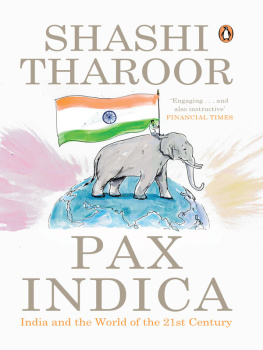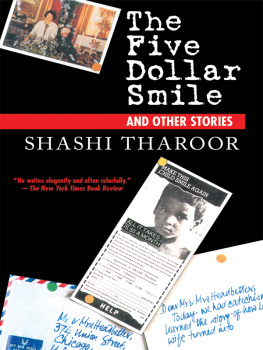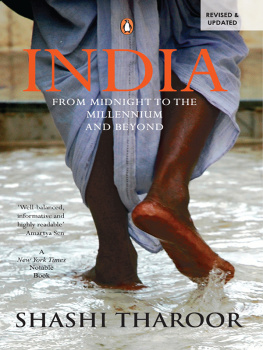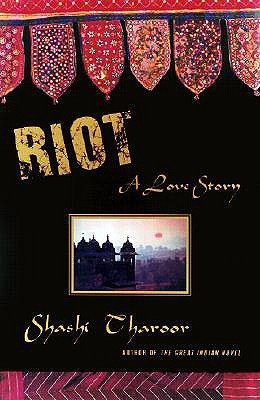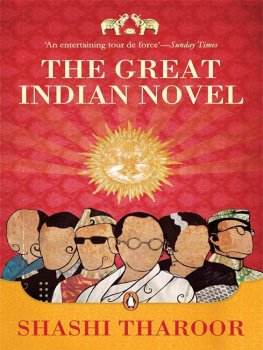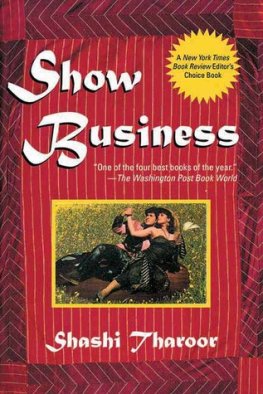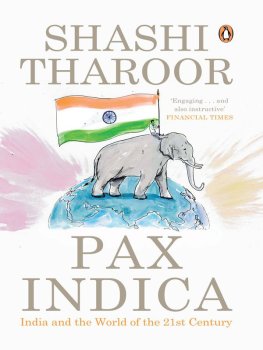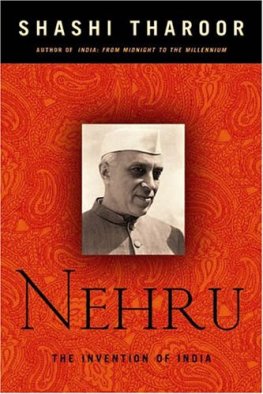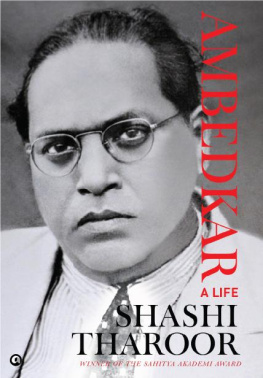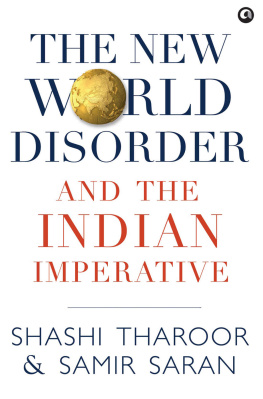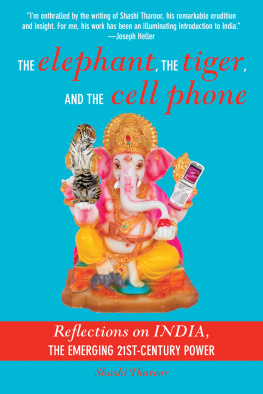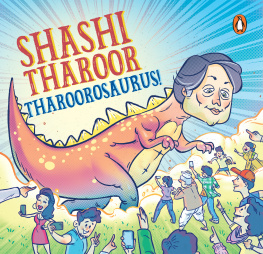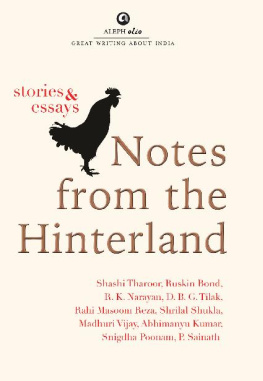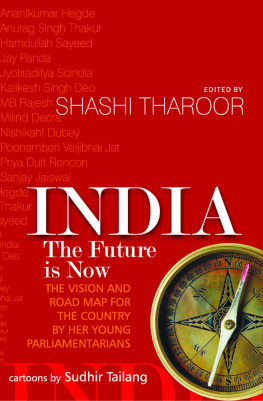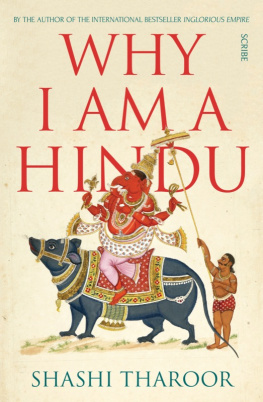Bookless
in
Baghdad
Also by Shashi Tharoor
Nonfiction
India: From Midnight to the Millennium
The Elephant, the Tiger, and the Cell Phone
Nehru: The Invention of India
Fiction
The Five-Dollar Smile and Other Stories
The Great Indian Novel
Show Business
Riot
Bookless
in
Baghdad
REFLECTIONS ON
WRITING AND WRITERS
Shashi Tharoor

Copyright 2005, 2011 by Shashi Tharoor
All Rights Reserved. No part of this book may be reproduced in any manner without the express written consent of the publisher, except in the case of brief excerpts in critical reviews or articles. All inquiries should be addressed to Arcade Publishing, 307 West 36th Street, 11th Floor, New York, NY 10018.
Arcade Publishing books may be purchased in bulk at special discounts for sales promotion, corporate gifts, fund-raising, or educational purposes. Special editions can also be created to specifications. For details, contact the Special Sales Department, Arcade Publishing, 307 West 36th Street, 11th Floor, New York, NY 10018 or info@skyhorsepublishing.com.
Arcade Publishing is a registered trademark of Skyhorse Publishing, Inc., a Delaware corporation.
Visit our website at www.arcadepub.com .
The essays collected in this book have appeared, in slightly different form, in the following publications: the New York Times Book Review, the Washington Post, the Washington Post Book World, Indian Express, Hindu, Seminar, India Today Plus, World Policy Journal, International Herald Tribune, and Newsweek International. They have been revised, updated, and edited for inclusion in this volume Permission to reproduce previously published material is gratefully acknowledged.
10 9 8 7 6 5 4 3 2 1
Library of Congress Cataloging-in-Publication Data is available on file.
ISBN: 978-1-61145-408-6
Printed in the United States of America
Contents
Preface
O VER THE YEARS I HAVE FOUND MYSELF expressing opinions on a host of subjects, in the op-ed pages of an assortment of newspapers around the world and as a fortnightly columnist, initially for the Indian Express and, since April 2001, for the Hindu. My pieces have ranged eclectically from cricket to politics and from Indian history to the challenges facing the United Nations. And many of them, inevitably, have dealt with matters literary.
Bookless in Baghdad is a collection of forty of my essays on literary topics, which have appeared in a variety of publications over the past decade. They span a broad range of concerns emerging from my own experience as an Indian writer (and reader!), but they share a literary provenance: none of my writings on nonliterary subjects have been included. All the essays have been written for the layperson rather than the academic specialist. They vary in length and tone depending on the publication for which they were first written, and though many have been revised and updated to see the light of day in 2005, I have not altered the views or judgments they originally contained.
Though I have reviewed many books, including several Indian novels, I have not included any of my book reviews in this collection. Rather, this volume seeks to assemble my ruminations on aspects of the literary experience that go beyond any single book. I hope that these essays will prove illuminating at times and provocative at others, and above all that they will impart something of the pleasure that the acts of reading and writing have always given me. To me, books are like the toddy tapper's hatchet, striking through the rough husk that enshrouds our minds to tap into the exhilaration that ferments within.
More than a century ago, Walter Pater wrote of art as professing frankly to give nothing but the highest quality to your moments as they pass. That may be all that reading offers; but it is no modest aspiration.
I
Inspirations
1
Growing Up with Books in India
G ROWING UP AS THE CHILD of middle-class parents in urban India in the late 1950s and 60s meant growing up with books. Television did not exist in the Bombay of my boyhood, and Nintendo (let alone the personal computer) was not even a gleam in an inventor's eye. If your siblings were, as in my case, four and six years younger (and worse, female), there was only one thing to do when you weren't with your friends. Read.
I read copiously, rapidly, and indiscriminately. Chronic asthma often confined me to bed, but I found so much pleasure in the books piled up by my bedside that I stopped resenting my illness. Soon reading became the central focus of my existence; there was not a day in my childhood that did not feature a book, or several. One year I kept a list of the volumes I'd finished (comics didn't count), hoping to reach 365 before the calendar did. I made it before Christmas.
An abiding memory is of my mother coming into my room around eleven every night and switching off the light. I wasn't smart enough to think of holding a flashlight under the covers, but sometimes I would wait for my parents to fall asleep in their room, then surreptitiously switch my light on again to finish the book they'd interrupted.
It was, of course, my mother who'd started me off on the bad habit to begin with. When I was still in diapers, she would read to me from the Noddy books of Enid Blyton, stories about a nodding wooden doll and his friends in Toy-land. My mother jokes that she read them so badly, I couldn't wait to grab the books from her myself; by the time I was three I was reading Noddy, and soon moving on to other stories by Blyton, easily the world's most prolific children's author, whose prodigious output (over two hundred books) could take you through an entire childhood. When I outgrew Noddy, there were Enid Blyton fairy tales, nursery fantasies, and retold legends; by seven I started on her thrilling mysteries of the Five-Find-Outers (and Dog); by eight I discovered her tales of British boarding-school life, midnight feasts and all; by nine I was launched on the adventures of the Famous Five and of four intrepid British teenagers in another series that always had the word adventure in its titles (The Ship of Adventure, The Castle of Adventure, and so on). Today, Enid Blyton has become the target of well-intentioned but overearnest revisionists, her stories assailed for racism, sexism, and overall political incorrectness. But my postcolonial generation (and today's Indians too) read her books entranced by her extraordinary storytelling skills and quite indulgent of her stereotypes. After two hundred years of the Raj, Indian children know instinctively how to filter the foreign to appreciate the best in things British, and not to take the rest seriously.
For colonialism gave us a literature that did not spring from our own environment, and whose characters, concerns, and situations bore no relation to our own lives. This didn't bother us in the slightest: a Bombay child read Blyton the same way a Calcutta kindergartner sang Jingle Bells without ever having seen snow or sleigh. If the stories were alien, we weren't alienated; they were to be read and enjoyed, not mined for relevance.
Indeed, the most popular British children's books other than Enid Blyton's were the ones that didn't take themselves too seriously. My own favorites were the William books of Richmal Crompton, minor masterpieces of brilliantly plotted hilarity involving the escapades of an irrepressible schoolboy (all tousled hair, grubby face, and cheeks bulging with licorice allsorts) who was forever tumbling into ditches, pulling off outrageous schemes, and messing up his elder sister's love life. A close second came the Billy Bunter series by Frank Richards, whose stories under half a dozen pseudonyms earned him attention in George Orwell's famous essay on schoolboy fiction. Richards created an uproarious world of British public-school characters, from the eponymous Bunter (a fat, frabjous frump) to his doughty Yorkshire classmate John Bull. There was even a dusky Indian princeling, improbably named Hurree Jamset Ram Singh, who played cricket magnificently, mixed his metaphors in a series of sage howlers, and answered to the name of Inky. I suppose that, reading the books in independent India half a century after they were written, I ought to have been offended; but I was merely amused, for Frank Richards never wrote a dull word in his long and productive career.
Next page
